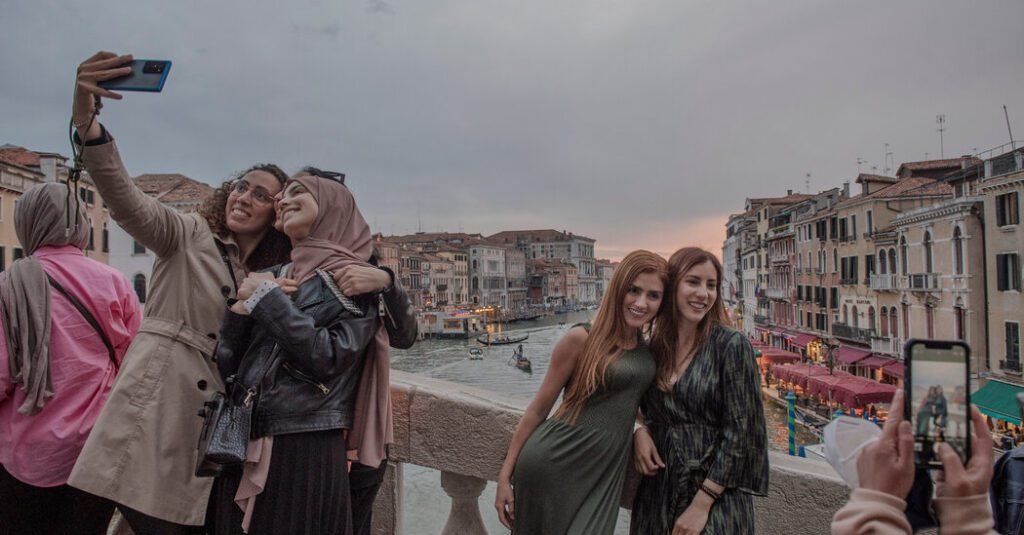On its busiest days, Venice swells with tourists who clog the city’s narrow streets, leave behind piles of rubbish and often frustrate the locals. So the city crossed by the canal fights back.
Starting April 25 and for another 29 days scattered mostly around national holidays and weekends until mid-July, day-trippers in the historic part of Venice will have to pay 5 euros, about $5.40, a measure that the city officials hope it will encourage people to come during less busy times.
All visitors to Venice will also have to register their presence in the city on designated days, filling out an online form that will help officials gauge how many visitors to expect and strategize how to handle them.
“It’s not about making money — the cost of the intervention is higher than what we’re going to do,” Mayor Luigi Brugnaro told reporters Thursday as Venetian officials launched a global publicity campaign. Instead, said Michele Zuin, the city’s budget and finance official, the goal is “to better manage the number of tourists and prevent mass tourism, which is what creates, let’s say, the difficulty of living in this city.”
Visitors staying overnight in Venice will not have to pay, nor will those traveling there to work, visit relatives or study. Anyone born in the city is also exempt, as are minors under 14. And Mr Brugnaro said there would be no upper limit on the number of visitors allowed.
Rising improbably from the waters of the Venetian lagoon, the city is as delicate as it is beautiful, and in recent decades has struggled to protect a uniqueness threatened by climate change and rising seas, as well as mass tourism.
To combat this figurative and literal erosion, the city has installed giant gates at four lagoon mouths to keep seawater out and sidewalks dry, and banned cruise ships from the inner canals. Those efforts have helped keep Venice off UNESCO’s “World Heritage in Danger” list, even as the agency’s experts raised concerns last year that Italy had not done enough to protect the city.
From 1976 until this year, Italy had allocated funds to help preserve Venice, and on Thursday Mr Brugnaro chided the country’s central government for not renewing that funding. He said he has asked the government for €1.5 billion over the next 10 years to help preserve a city with a unique heritage that requires ongoing maintenance.
“We need that funding,” he said.
Occasionally, the days were so packed with tourists that the city had to restrict certain streets to one-way pedestrian traffic.
Simone Venturini, the city’s tourism official, said of the new measures: “We will be the first city in the world to know exactly how many tourists will come to Venice that day — whether they opt out or pay, they have to register . “
After registering on the site, visitors will receive a QR code — valid from 8:30 A.M. until 4 p.m. seaside locations and St. Mark’s Square. There will also be spot checks throughout the city.
For now, anyone arriving in Venice without a QR code will be allowed to buy it at the last minute, either on a smartphone or at kiosks set up by access points, officials said.
Violators will face fines of 50 to 300 euros plus a 10-euro fee, Mr. Zuin said.
The initiative is being introduced on a trial basis so city officials can see if the system is working and how it can be improved, he said. In the future, the admission fee could be calibrated — “a sliding scale of prices,” Mayor Brugnaro said — depending on the day.
“We are asking for cooperation,” Mr. Brugnaro said, adding that the data collected during the 29 days would be made public. He said officials from other cities around the world had contacted his administration to learn more about the access system.
So far, more than 50,000 people have registered through the site — about a third of them paying for one-day visits, officials said.
“The whole world wants to come to Venice,” Mr Venturini said when introducing the ad campaign, which included a video message of the mayor speaking in different languages using AI-generated speech translation.
In the video, Mayor Brugnaro apologizes for any inconvenience the new system may cause. But, he said, “the city must be protected.”

